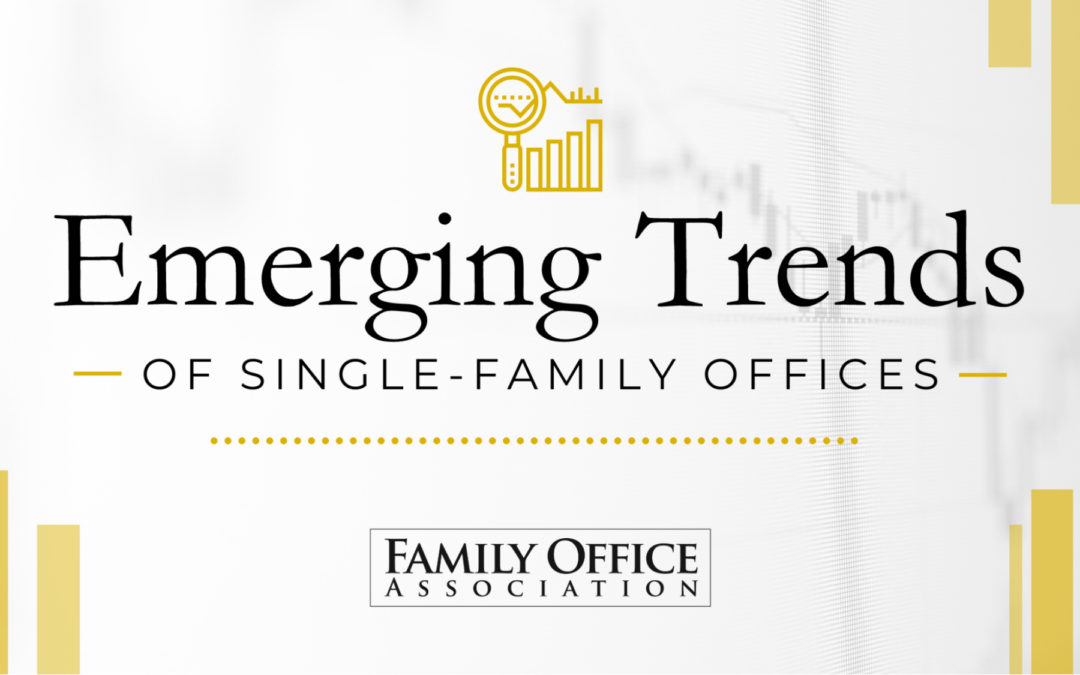Family Office Association (FOA) welcomes you to our weekly Blog, dedicated to our members and the greater family office community seeking education and insight into the ever-changing family office landscape.
Macro-Trends in SFOs
The evolution of Single-Family Offices (SFOs) has been an intriguing and transformative journey, reflecting wealthy families’ changing needs and aspirations over time. Throughout their development, SFOs have experienced significant trends that have shaped their structures, operations, and outlook, propelling them forward into the modern era of wealth management.
One notable trend in the SFO landscape is the increasing professionalization and institutionalization of family offices. In the past, SFOs often operated on an informal basis, managed by family members or trusted associates who sought to preserve and grow wealth through their personal experiences and intuition. However, as wealth became more complex and multidimensional, families recognized the need to tap into specialized expertise to effectively navigate the intricate financial landscape.
The Not-So Family, Family Office Approach
The professionalization of SFOs has brought about remarkable transformations in how they operate. Families now turn to professionals with extensive experience in finance, investment management, taxation, and other crucial fields to manage their financial affairs. These professionals bring a wealth of knowledge, a deep understanding of the intricacies of managing substantial wealth, and the ability to tailor strategies to individual family goals. By leveraging their expertise, SFOs are better equipped to develop comprehensive financial strategies, make informed investment decisions, optimize tax planning, ensure efficient estate management, and implement effective risk mitigation measures.
Moreover, as SFOs have become more sophisticated in their operations, they have adopted institutionalized structures akin to those found in larger financial institutions. This trend has resulted in the establishment of dedicated investment teams, compliance departments, legal experts, and back-office support personnel within SFOs. These internal structures ensure thoughtful decision-making processes, meticulous adherence to regulations, rigorous due diligence, and efficient operational management.
Digitizing the Next Generation
Another notable trend in SFOs is the pervasive integration of technology and digitalization into their core operations. As digital transformation sweeps across industries, family offices have wholeheartedly embraced technological advancements to streamline their processes and enhance efficiency. Through the adoption of cutting-edge financial software, data management systems, and other digital tools, SFOs have gained the ability to comprehensively monitor and analyze wealth portfolios, access real-time financial information, and facilitate seamless communication among family members and advisors.
Technology innovation has also revolutionized investment management in SFOs. Advanced algorithms, machine learning, and artificial intelligence-driven platforms enable family offices to conduct sophisticated data analysis, identify emerging market trends, and make data-informed investment decisions swiftly and accurately. These technologies also facilitate easy access to global financial markets, empower SFOs to diversify their investments across various asset classes, sectors, and geographies, and enable them to capitalize on opportunities, ultimately maximizing growth potentials and minimizing risks.
Guide Rails – A More Collective and Objective Approach
Alongside the professionalization and digitalization of SFOs, there has been a growing emphasis on governance and risk management in recent years. Wealthy families are becoming increasingly cognizant of the necessity to establish transparent and robust governance structures within their family offices. By creating well-defined policies, roles, and responsibilities, families can ensure effective decision-making processes, promote accountability, and reduce conflicts among family members.
A vital aspect of establishing effective governance structures is the inclusion of independent board members or external advisors, who provide valuable perspectives, impartial advice, and oversight of the family office’s activities. The input of independent experts aids in maintaining strong corporate governance, reducing potential conflicts of interest, and enhancing family cohesion.
Furthermore, as wealth preservation and succession planning are paramount, effective risk management has become critical. SFOs now routinely employ risk management strategizers to anticipate, evaluate, and address potential threats to the family’s wealth and legacy. Robust risk management frameworks enable family offices to proactively navigate economic uncertainties, market volatilities, and unforeseen events, safeguarding the family’s financial well-being and ensuring the longevity of their wealth across generations.
Doing Well by Doing Good
In recent years, another significant trend in SFOs has been the emergence of impact investing and philanthropy as integral components of wealth management strategies. Wealthy families are increasingly seeking to align their financial endeavors with their moral and social values, leveraging their resources to make positive contributions to society. By integrating environmental, social, and governance (ESG) criteria into their investment decisions, SFOs actively support sustainable and responsible business practices. Simultaneously, philanthropic initiatives empower families to address pressing societal challenges, fund innovative solutions, and create lasting changes in areas such as education, healthcare, poverty alleviation, and environmental conservation.
Globalization
Moreover, the global nature of wealth and families has necessitated a greater focus on internationalization within SFOs. In an increasingly interconnected world, families are diversifying their investments across different countries and regions to capitalize on opportunities, manage risks, and access new markets. International investments offer SFOs the potential for enhanced returns, exposure to emerging economies, and the ability to align wealth with global megatrends. Additionally, internationalization allows families to provide global experiences, education, and mobility for family members, fostering greater cultural understanding, adaptability, and business acumen.
As the world continues to evolve, so too must SFOs. The ongoing trends within the SFO landscape highlight the significance of staying informed, embracing innovation, and remaining agile in the face of changing circumstances and complexities. By following these trends, SFOs can efficiently serve the evolving needs of wealthy families, ensuring their wealth’s long-term preservation and growth for generations to come. If you have further questions or wish to enhance your family office, contact the team at Family Office Association.

